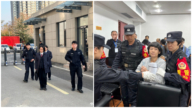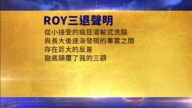【新唐人2012年10月20日讯】一年前因言获罪,被重庆市劳教委宣布劳教两年的重庆村官任建宇,最近成了中共媒体争相报导的对像。令人惊奇的是,中共多家媒体对“劳教制度”提出了批评。中共官员也暗示,“劳教制度”存在问题,正在研究改革方案。《路透社》的报导认为,种种迹像似乎预告:当局力图避免加剧民众在“十八大”前夕的负面情绪,同时也为中共新一届领导人释放所谓“拓展舆论空间”的信号。不过,评论分析人士多数认为,不能对中共的改良抱持任何幻想,“18大后取消劳教”的预言,恐怕下得过早。
重庆第三中级人民法院,10月10号开庭审理了任建宇状告重庆市劳教委一案。这一案件受到了社会各界和国际媒体的广泛关注。
代理“任建宇劳教案”的北京律师浦志强18号向《自由亚洲电台》表示,重庆方面当天已与任建宇本人进行了接洽,重庆劳教委有望就他的“劳教决定”作出修改。
现年25岁的任建宇大学毕业后,于2009年获重庆市选派出任彭水县郁山镇“村官”。去年4月至8月,任建宇因为在微博上转发时政评论信息100多条,被重庆劳教委认定“煽动颠覆国家政权”,劳教两年。
“东南大学”法学教授 张赞甯:“劳教制度是恶法,他也是一个法外法。我们中国法律明确规定,中华人民共和国的公民,如果不经人民法院和人民检察院批捕、由公安机关执行,公民的人权自由不受剥夺。 这个恶法必须解除,必须撤销。”
司法部“司法研究所”所长王公义18号在“蓟门决策论坛”上表示,目前被劳教人员数量有6万多,被劳教人员最多时达到30多万人。
而大陆的官方媒体近来罕见的对“劳教制度”提出了批评。
中共喉舌《人民日报》旗下的《环球时报》,针对判处任建宇劳教一案评论说,“因发表批评性意见就被判刑,这种惩罚与言论自由和法制国家的原则相抵触,是过时的做法。”《新京报》更一针见血的说:“ 如果照这样的标准就可以实施劳教,全中国5.13亿网友,有多少会被送去劳教,这个数字恐怕没法统计。”
《新华网》则借用多名学者的口气指称,“ 废除劳教,天不会塌下来。”
张赞甯律师指出,这可能是新领导班子意识到了劳教是超越法律的恶法,才允许媒体作这一类报导。
巧合的是,就在任建宇案开庭的前一天,国务院yabo88官网办发布了《中国的司法改革》白皮书。
中共“司法体制改革领导小组”办公室负责人姜伟承认,“劳教制度”的一些规定和认定程序存在问题。他表示,相关部门正在研究具体的改革方案。
独立评论员李善鉴则表示,这表明中共内部已经意识到,党和人民的对立越来越强烈,如果不舒缓,就会出大事,这是他们想缓解矛盾做出的试探。
独立评论员李善鉴:“很多东西底线它是不敢放的,因为在中国近代史上,特别是49年以后,这个党对中国人犯下的罪太大了,这些东西一旦放开的话,它的合法性没有办法去解释。”
李善鉴认为,不能对中共的改良抱任何幻想,特别是涉及到他们个人利益的时候,尤其是涉及到执政合法性的时候,中共政权是什么没有底线的。
李善鉴:“ 这个党为了自己生存,它可以不择手段,所以今天他提出搞民主、提出什么,这个是一点也不奇怪,它也是为了生存的一个必要。但是,即使它今天搞了民主了,明天它为了生存拿起屠刀的时候,它绝不会犹豫的。”
李善鉴还指出,历史证明,在保留中共生存的前提下做改良,这条路是走不通的,中国的出路是必须结束中共的一党专制。
采访/陈汉 编辑/宋风 后制/周天
CCP Mouthpieces Critical to Labor Camps?
Ren Jianwu, a Chinese Communist Party’ (CCP) critic,
had recently attracted the attention of media.
Last year he got two-year jail sentence due to openly
expressing his opinion on the CCP’s downfall.
Surprisingly, now the CCP media is openly criticizing
the labor camp system.
CCP officials also hinted of problems in the labor camp
system, thus its reform has been discussed.
Reuters reported that the authorities try to avoid
intensifying of social tension before the 18th CCP congress.
It also hints that the new leadership would allow
more freedom of expression.
However, analysts believe one cannot have high hopes
when it comes to CCP’ changes.
It is too soon to be able to predict the “closing down
of the labor camps after the 18th CCP congress”, they think.
On October10, Chongqing No.3 Intermediary People’s Court
opened a trial for Ren Jianwu.
Ren sues the Chongqing labor camp committee, and the case
has been widely reported by media at home and abroad.
His lawyer, Pu Zhiqiang told Radio Free Asia on October18,
that Chongqing authorities have met with Ren, and the labor camp committee intends to review his verdict.
After graduating, Ren Jianwu, 25, was appointed in 2009,
as a village official in Yushan town, Pengshui county.
From April to August last year, Ren posted
over 100 messages on a microblog, criticizing the CCP.
Later he was sentenced to a labor camp for two years
by Chongqing’s labor camp committee, charged for “inciting subversion of state power.”
Zhang Zanning, Southeast University Law Professor: “The
re-education system is an evil law, it’s a law outside the law.
China’ law clearly states, citizen can be arrested by police
without permission of People’s court or the Procurator.
Citizens’ human rights are being abridged.
This evil law must be abolished.”
Wang Gongyi, head of Justice Research Institute at Ministry
of Judiciary Bureau, spoke in an open forum on October 18.
Wang said, there are 60,000 labor camps prisoners at present,
which at times reached up to 300,000.
Now the official media is criticizing
the labor camp system openly.
Several CCP outlets, including Global Times, said, “Being
sentenced for critical expression goes against freedom of speech and the rule of law, it’s outdated.”
The Beijing News wrote, “If re-education through labor can
be implemented like this, with the 513 million netizens in China the figure will be difficult to calculate.”
Xinhua website cited many scholars who said, if we are
to “close down the labor camps, the sky won’t fall down.”
Lawyer Zhang Zanning thinks the new leadership is maybe
realizing that the labor camps are an evil law above the law, thus the media are allowed to report on the issues.
On the same day of Ren’s trial, the State Council information
office released a White Paper on China Judicial Reform.
Jiang Wei, head of China Judicial System Reform Team,
spoke of the issue.
Jiang said, there are problems with the rules and procedures
of the labor camp system, thus a reform is being discussed by the relative departments.
Li Shanjian, an independent commentator, thinks this hints
the CCP is realizing there are internal and external tensions.
They are growing and if there is no easing, a major incident
may happen, thus CCP is testing how to ease these tensions.
Li Shanjian: “The CCP dares not go below the base line
of China’s modern history.
After 1949, this party has committed too many crimes; once
they get public, there is no way to explain its legitimacy.”
Li Shanjian believes that it is unrealistic to expect
from CCP any improvements.
When the personal interests come into the picture, and more
so their legitimacy, CCP’s regime won’t know limits.
Li Shanjian: “In order to survive, the CCP can do anything,
now they propose to be democracy, it isn’t surprising.
It is necessary for the CCP to do so,
as this is about their survival.
But if CCP withdraws their proposal today, tomorrow
they will pick up a knife to kill without any hesitation.”
Li Shanjian pointed out that people learn from history,
so to reform under the CCP’s rule will not work,
China must end CCP’s dictatorship,
and that is the only choice for China’s direction.




























